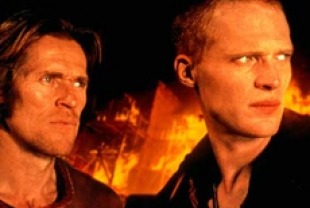Welcome to fourteenth century England, not the best of times by a long shot. Most people have lost relatives to the plague known as the Black Death, and the gap between the rich barons and the poor is a virtual abyss. The church is very closely tied to those in power. Medieval dramas usually deal with episodes from the Bible, but this genre is on its last legs. This is the setting for The Reckoning, a serious and soul-stirring film directed by Paul McGuigan based on Barry Unsworth's Booker Prize-nominated novel Morality Play. The screenplay has been written by Mark Mills.
Nicholas (Paul Bettany) is a renegade priest who is forced to abandon his parish ministry and take to the road. He stumbles upon a small troupe of traveling players who have just lost one members of their company. They are led by Martin (Willem Dafoe), a charismatic performer. Nicholas asks if he can join them, and after a minor audition, he is voted into the troupe. Martin's sister Sarah (Gina McKee) senses that he is running from some serious trouble, and she is right.
Fate, in the form of a destroyed bridge, sends them to a town they've never been to before. The troupe discovers that the community is gathered to hear the verdict in the trial of Martha (Elvira Minguez), who is sentenced to be hanged for the murder of an adolescent boy. After receiving only a little money for their performance of one of their staples — "The Fall of Adam and Eve" — they don't have enough to pay for their friend's funeral. Nicholas explains that he is a priest and can lead the service.
Martin, who is tired of the tradition of medieval plays, comes up with the idea of performing a play about the murder. Tobias (Brian Cox), the elder member of the acting troupe, is dead set against this idea since it would deviate from the Bible. Trying to find out more about the events surrounding the crime, Martin and Nicholas question members of the community and interview the accused woman. It turns out that she cannot hear or speak and must use sign language and read their lips to communicate. According to Martha's account, she was set up by a local monk who hid the stolen money from the boy's purse in her home. When Nicholas talks to her father, he finds out that she has been persecuted by the church for healing men, women, and children in the community. The charge of witchcraft has made her a target of those in power.
When the new play is performed, the large audience is very caught up in the proceedings. The monk (Ewen Bremner) who charged the woman with the crime reports to Lord Robert de Guise (Vincent Cassel) that these outsiders are fomenting trouble on the streets. The players are ordered to leave town by the sheriff. On the night before, Nicholas takes matters into his own hands and soon finds himself puzzling over complications surrounding the murder that go far beyond the suspect and even the townsfolk.
This tension charged medieval thriller contains many spiritual themes including the high cost of pursuing justice, the nature of faith, the meaning of human suffering, and the dangers of speaking out against those in power. Paul Bettany puts in a stellar performance as the renegade priest whose search for the truth in a labyrinth of lies and cover-ups is quite compelling. Willem Dafoe is convincing as the innovative leader of the actors whose conscience comes alive under the intensity of his new friend's zeal for justice. It is actually quite amazing that the themes of this substantive drama have so much relevance to the present-day crimes of those in high places who are convinced they are above and beyond the reach of the law.
